Interview with Piedad Guallpa of FAMAS
Agroecological Front of Women Artesans of Shagalpud
Medicinal Ointments: the Knowledge of the Ancestral People
Shagalpud, Cañar Province, Ecuador
|
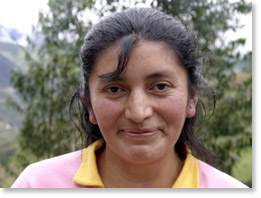 |
|
Piedad Guallpa in Shagalpud. All photos by Nic Paget-Clarke.
|
|
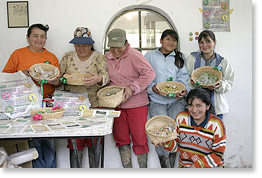 |
|
Members of FAMAS with baskets of their medicinal ointments on the first floor of the FAMAS house.
|
|
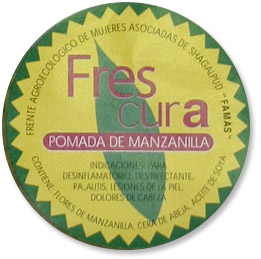 |
|
Manzanilla ointment.
|
|
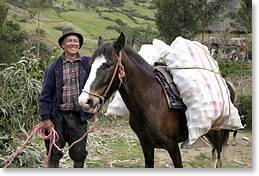 |
|
Vicente Calle, a member of the Shagalpud community in the Andes Mountains, transporting corn by horse. (Click here to see a larger version.
|
|
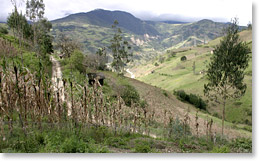 |
|
A scene from Shagalpud.
|
Piedad Guallpa is a member of FAMAS (the Agroecological Front of Women Artesans of Shagalpud). FAMAS is a group of 15 campesinas rooted in the community of Shagalpud, in the Rivera parish, the Azogues canton, Cañar province, Ecuador. This interview was conducted (and later edited) by Nic Paget-Clarke for In Motion Magazine on September 4, 2007 in the FAMAS house in Shagalpud. In Motion Magazine visited Shagalpud with two members of FENOCIN, Aníbal Zumbana (coordinator of FENOCIN's Agroecological Project, South Sierra Region) and Pedro Fuentes B. who work together with FAMAS. The interview was translated from Spanish to English by Mónica Fernández with later editing by irlandesa.
Our life is productive
Piedad Guallpa: We have been working since November 2002. Our life is productive. We make medicinal ointments.
In Motion Magazine: What is the process of growing the plants and the ointment production?
Piedad Guallpa: There are 15 members. Each member cultivates the medicinal plants they need in their family gardens. They contribute the base material for the production of the medicinal ointments only when we have orders and for fairs. We produce the ointments according to a committee of compañeras charged with production.
What we do is we collect the best plants, and then we bring them here. We wash them, and, after washing them, we weigh them. Another compañera places soya oil and bee’s wax in a Baño de Maria (double boiler), and when it is dissolved she the plants in the pot and covers it. The process takes an hour and a half. After the hour and a half, we pass it all through a sieve, and put them in little boxes.
From five medicinal plants
In Motion Magazine: What are the health benefits of the medicinal ointments?
Piedad Guallpa: We produce five varieties of ointments which are: (one,) pure eucalyptus with soya oil and bee’s wax, which is good for the respiratory system, the muscular system and bruises.
(Two,) camomile, without other ingredients (except) the soya oil and the bee’s wax, which is good particularly for allergies, inflammations (swelling), headaches, stomach aches (also skin infections, and inflammations of the liver, kidneys, vesicle) and eye irritations. It is for external use. The ointment is rubbed on and it provides immediate relief.
(Three,) the ointment of matíco and ortíga (ortiga is stinging nettle) combined with small percentages of chilca blanca, alder, and nogal. This ointment is good for the muscular system, arthritis, bone pains and all sorts of illnesses brought on by the cold.
(Fourth,) calendula with combinations of shipapal, altamiso and vervena. These are bitter herbs that kill strong infections of the skin: fungus, acne, and slight skin burns. This ointment has been a big success in the market. People know it. It is beginning to be used a lot.
And lastly, we have the “hierba de infante y geranio” (geranium). This is good for disinfecting and healing wounds. It heals wounds and regenerates tissue with the bee’s wax it contains.
The bee’s wax is medicinal and helps the medicinal plants.
The knowledge of the ancestral people
In Motion Magazine: Where do you sell the ointments?
Piedad Guallpa: We sell in Azogues and Cuenca. Little by little. We have promoted our products in the trade fairs organized by FENOCIN and government institutions.
Two years ago, we were in an international health fair where people from all over the world got to know us. Five hundred ointments were handed out at this international level. We are this tiny little group, and we live so far away from an urban area. Being known on a worldwide level is good for the organization. It strengthens us.
In Motion Magazine: What are the benefits for the women from selling your products?
Piedad Guallpa: Now, the economic benefit is not much. Rather, the benefit has been that of organizing ourselves, of knowing other places, experiences, and customs, joining together with other people who have helped us to mature and given us the opportunity to grow. What has been sold has been re-invested into the project. Also we have been successful in integrating families into the project, in their participating and beginning to see and value what we do.
(Also) the uses of the plants were re-compiled from the knowledge of the ancestral people, from older people. We had great people who knew about the benefits of medicinal plants, which we were unaware of.
We did a feasibility study to see which diseases are most common here and which ointments had not been to the market. We concluded that the most common illnesses are those caused by the cold, such as respiratory system problems, muscular system problems, as well as severe skin infections. Based on information from people who know about the usefulness of the medicinal plants, we produce exclusive ointments for these climate-related illnesses.
Our future is a little uncertain. What we want is for our children and our grandchildren to strengthen the work that we have done. In the future, we hope that we will continue with the ointments, hopefully seeking greater consistency, using more herbs, not creating new ointments.
Also, we want to produce teas. What we do want to do is to have a good market, hopefully to produce [“a”] large enough quantity so that it is profitable, because if we produce more the prices go down. This way we would help ourselves as much as the consumers.
The strength of the organization
In Motion Magazine: How many people live in Shagalpud?
Piedad Guallpa: There are thirty-seven families in the community and fifteen in our group. Each family has an average of four or five members.
In Motion Magazine: How did the 15 women decide to get involved in this project?
Piedad Guallpa: I wasn’t here yet. I was living in Cuenca, but it began with the equal initiative of eight compañeras and a Peace Corps volunteer, Emily. The compañeras started with textiles and decided, with the support of FENOCIN and the Agroecological Project to also begin family gardens. Every week we had one day of work in each garden -- we alternated between them.
With the volunteer and the support of the Peace Corps, we attended a workshop on medicinal ointment production in Salinas de Guaranda (in Bolivar province).
In November 2002, we began the first experiment in which we brought the bee’s wax and the boxes into the house of one of the compañeras. Immediately, one of the ointments was used on a wound of one of the compañeras’ sons who was bitten by a horse. Immediately he was healed and left without a scar.
At the beginning we started just out of curiosity, but then we invited the other compañeras. We asked, “Who wants to do it?” And then we were 14. And then we were 16.
We carried out projects with the volunteer which were secured with the support of the Peace Corps, the provincial council, people in the community. We managed to get a piece of land and to buy what we most needed for the production of the ointments. With the support of the provincial council we built the first floor of our house. And, with the sale of the ointments and with the support of people in solidarity, we are building a second floor.
What we have as mementos are the t-shirts we bought from the sale of ointments. The shirts and nothing else. Oh, and the house (laughing)!
In Motion Magazine: Is there anything else you would like to say?
Piedad Guallpa: What I have always said is that it is the strength of the organization that serves us well. If we do not organize ourselves, nobody is going to give us anything.
Published in In Motion Magazine February 21, 2008
Also see:
- Entrevista con Piedad Guallpa (in Spanish)
- Interview with Diogenes Lucio of FENOCIN
The National Confederation of Peasant, Indigenous, and Black Organizations
Agroecology and the Andean Cosmovision
Quito, Ecuador
- Interview with Miguel Angel Crespo of PROBIOMA
A Contribution To Agroecology:
Biological Control, Certified Forest, Local Control
Santa Cruz de la Sierra, Bolivia
- Interview with Juana Benavides
Sustainable Development in Bolivia
"Not Sustainable If It Doesn't Mean Income For The Families”
The Management of Vicuña
On the road to Sajama National Park
Oruro Department, Bolivia
- Interview with Dr. Luis Macas of CONAIE
The Confederation of Indigenous Nationalities of Ecuador
“What we are proclaiming is the self-determination of the peoples”
Quito, Ecuador
- Interview with Bertha Blanco of Bartolina Sisa
National Federation of Campesina Women of Bolivia /
IPSP Department / For the Sovereignty of the Peoples
Part 1: Defense of the Peoples
Part 2: The History of Our Ancestors /
Time to Take Responsibility for Political Decisions
La Paz, Bolivia
- Interview with Miguel Angel Nuñez
Farmers are Demanding Agroecology:
Making Democracy Participative
Barinas and Caracas, Venezuela
- Interview with Severine Macedo
Youth Representative of FETRAF-SUL
Independent Alternatives for Rural Youth
Chapecó, Santa Catarina, Brazil
- Interview with L. A. Samy and Christina Samy of AREDS and SWATE
Association of Rural Education and Development Service /
Society of Women in Action for Total Empowerment)
The poor have to be united / You create alternatives
Renganathapuram, Tamil Nadu, India
- Interview with Gustavo Esteva
The Society of the Different
1 The Center of the World
2 We Are People of Corn
3 Regenerating Community
Oaxaca, Oaxaca, Mexico
- Interview with Geraldo Fontes of the MST
The Landless Rural Workers' Movement
“Without depending on power or having to take power”
Part 1 -- Building the New Society Now
Part 2 -- Agrarian Reform / Agribusiness
São Paulo, Brazil
|







